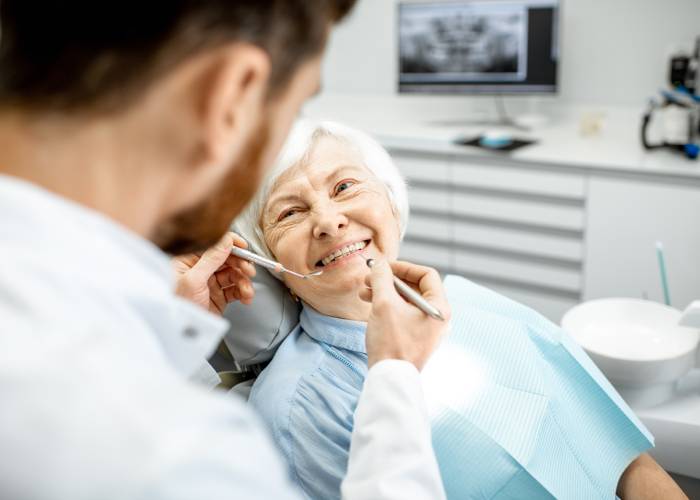Seniors and Oral Health

There is no denying that the aging process can bring increased health challenges, including oral health. While getting older in itself does not necessarily lead to dental problems, other medical conditions related to aging and medications can be factors that affect your teeth and gums.
However, it is not all doom and gloom. As a senior, you can still help reduce the risk of oral health problems by maintaining a good oral care routine.
Oral Health Care for Seniors
As you get older, your teeth and gums still need the same care and attention as when you were younger. Indeed, maintaining good dental health as a senior relies on the same principles of oral care regardless of age.
Neglecting your oral hygiene can soon cause a build-up of plaque and tartar on the teeth. This in turn can lead to tooth decay and gum disease. Therefore, it is important that as a senior you maintain the basics of a good oral care routine. This includes:
- Twice daily brushing with a soft-bristled toothbrush.
- Brushing teeth using toothpaste containing fluoride.
- Continuing to floss daily.
- Rinsing at least once a day with an antiseptic mouthwash to help reduce bacteria in the mouth and wash away food particles that may be trapped between the teeth.
- Maintaining regular dental appointments, where your dentist can spot potential dental health issues earlier when they can be simpler to address.
Maintaining a consistent oral care routine helps reduce the risk of oral problems as you get older. However, other health factors as you age can also impact your oral health, and being aware of how they present will help you decide when you should consult with your dentist.
Oral Health Risks that May Increase with Age
The aging process brings overall health challenges that can also affect the health of your teeth and gums. Sometimes this can be due to the impact of medication required to treat a health condition. Other times this may be due to the condition itself.
For example, arthritis can make it much harder to hold a toothbrush to properly clean your teeth. In this case, the resulting build-up of plaque and tartar can increase the risk of tooth decay and gum disease.
The following list covers five areas around oral health where the aging process could place you at an increased risk.
1. Dry Mouth
Some health conditions and the medications required to treat them can cause dry mouth. This is where you experience reduced saliva production. Cancer treatments involving radiation around the head and neck can lead to a dry mouth.
Saliva helps you chew and swallow your food, and helps maintain the balance of bacteria in the oral cavity and assists with the breakdown of food particles. Someone with a dry mouth due to reduced saliva production is at more risk of tooth decay, gum disease and fungal infections.
Unfortunately, it is not just dry mouth that may result from medical conditions and the medication required to treat them as you age. While you can naturally lose some degree of your sense of taste as you get older, diseases, health conditions and medication can also be a contributing factor.
2. Gum Disease and Tooth Loss
Regardless of age, poor oral care can result in gum disease and tooth loss. Plaque will accumulate and form the hardened substance tartar which leads to cavities and tooth decay.
However, gum disease can also become a bigger headache as you age if the effects of a sustained poor diet, smoking and health conditions like diabetes take their toll on your dental health.
If you have dentures or a dental bridge that is ill-fitting this can also result in gum disease. Food particles and bacteria get trapped in the resulting gaps and this may result in gum disease, a leading cause of tooth loss.
3. Teeth Appear Darker
As we age the outer layer of tooth enamel can thin, exposing more of the darker yellow-colored dentin beneath. This gives your teeth a darker appearance. However, it is not the only reason why your teeth may get darker in color, as the food and drink we consume as well as nicotine products will stain teeth over time.
Teeth that appear darker may also indicate more serious health issues, so it is always worth consulting with your dentist if you notice such darkening.
4. Root Decay
Root decay is also something seniors can be more prone to experiencing. Gum recession can expose the tooth roots to the acids that also attack the tooth enamel. When the gums recede, they expose the root of the tooth, which is vulnerable to decay-inducing acids.
5. Candida Albicans
Candida albicans is a natural yeast found in the mouth and other parts of the digestive tract. However, certain conditions and medications that impact the immune system can increase the levels of the yeast. This may lead to a fungal infection such as thrush.
An overgrowth of this natural yeast can also cause inflammation of the tissue beneath dentures. Known as stomatitis, poor oral care or ill-fitting dentures can also cause such inflammation.
When to Visit Your Dentist
Seniors should continue to maintain regular dental appointments. However, if you notice any changes in the oral cavity such as those listed above you should also consult with your dentist. This could include experiencing:
- increased sensitivity
- loose teeth
- pain or discomfort
- bleeding when brushing
- lumps
- sores
- problems when chewing or swallowing
Your dentist will carry out a thorough evaluation of your dental health and is likely to inquire about your past dental history if you are new to the surgery. Among the health conditions your dentist can check for is oral cancer.
Age is not the primary factor for dental problems for seniors. Lifestyle influences, health conditions experienced and medications taken as you get older can have an impact on your dental health. However, a good oral care routine and regular dental appointments will still help reduce the risk of poor oral health as you grow older.




